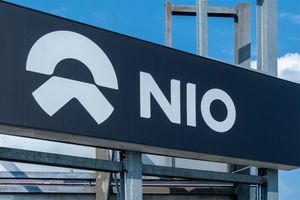
Morningstar, the respected financial research firm, has significantly upgraded its fair value estimate for Broadcom (NASDAQ: AVGO) from $225 to $325 per share. This substantial revision signals a robust belief in the semiconductor giant's accelerating trajectory within the burgeoning artificial intelligence (AI) chip market. The decision, primarily driven by a materially increased long-term AI chip growth forecast, underscores Broadcom's strategic positioning and highlights the profound implications for its investors and the broader tech landscape.
This valuation adjustment comes as the AI sector continues its explosive expansion, with Broadcom emerging as a key beneficiary. The revised estimate suggests that Broadstar views Broadcom's current market valuation as more aligned with its intrinsic value, a significant shift that reflects the anticipated surge in AI-driven revenue over the coming years. For investors, this reassessment provides a fresh perspective on Broadcom's long-term potential, though initial market reactions indicate that a significant portion of this optimism might already be priced into the stock.
Morningstar's AI Bet: Why Broadcom's Future Looks Brighter
Morningstar's decision to boost Broadcom's fair value by a striking $100 per share is anchored firmly in a substantially increased long-term growth forecast for its AI chip segment. The core of this optimistic outlook stems from an anticipated revenue surge, including up to $10 billion in incremental orders expected in the second half of fiscal 2026 from a new XPU (accelerated processing unit) customer. This figure alone could effectively double the company's total AI revenue for that year, a staggering addition to Morningstar's previous projection of 60% AI chip growth in fiscal 2026.
Broadcom's recent performance has already laid the groundwork for this bullish re-evaluation. The company reported a 63% year-over-year increase in its July-quarter artificial intelligence chip revenue, reaching $5.2 billion. Furthermore, Broadcom has successfully secured a fourth custom AI chip customer, a development expected to further accelerate AI revenue growth into fiscal 2026. Speculation abounds that the significant new customer could be OpenAI, signaling a pivotal role in the development of inference chips, while Apple (NASDAQ: AAPL) and Arm (NASDAQ: ARM) are also rumored to be part of Broadcom's custom AI chip pipeline, hinting at even greater potential upside from additional XPU sales. The timeline leading to this moment has seen Broadcom consistently invest in custom silicon solutions, leveraging its expertise in networking and connectivity, positioning itself perfectly for the current boom in AI infrastructure. Key stakeholders involved include Broadcom's management and engineering teams, Morningstar's analyst pool, and of course, the ever-watchful global investor community.
Despite the highly positive guidance concerning AI revenue, the initial market reaction saw Broadcom's stock rise a modest 4% after hours. This subdued immediate response suggests that a substantial portion of the anticipated upside had already been factored into the market by savvy investors. Morningstar maintains its "Wide" economic moat rating for Broadcom, signifying a strong and sustainable competitive advantage, yet simultaneously assigns a "High" uncertainty rating, acknowledging the inherent volatility and rapidly evolving nature of the AI market. The growth of its AI chip business, coupled with its ability to leverage growth and operating efficiency from its acquisition of VMware, are identified as the primary drivers underpinning Broadcom's enhanced valuation.
The AI Chip Race: Who Wins and Who Faces Headwinds
Morningstar's elevated outlook for Broadcom, driven by its prowess in AI chips, inherently creates a ripple effect across the semiconductor industry, identifying clear winners and potentially challenging some existing players. Broadcom (NASDAQ: AVGO) itself stands out as the immediate and primary winner. The increased fair value estimate validates its strategic focus on custom AI silicon and its ability to secure major design wins with hyperscale data center customers and AI innovators. Its specialized networking solutions, crucial for connecting the vast arrays of GPUs in AI clusters, further solidify its indispensable position. This translates into increased revenue, potentially higher profit margins from these custom, high-value products, and a stronger bargaining position in future deals.
Beyond Broadcom, other companies deeply embedded in the AI hardware ecosystem are also poised to benefit. Nvidia (NASDAQ: NVDA), the undisputed leader in AI GPUs, will continue to thrive as the overall demand for AI infrastructure skyrockets. Broadcom’s networking solutions often complement Nvidia’s GPU deployments, meaning increased AI adoption benefits both. Similarly, other custom silicon designers and foundries like Taiwan Semiconductor Manufacturing Company (TSMC) (NYSE: TSM), which manufactures Broadcom's advanced chips, stand to gain from the increased volume and complexity of AI chip orders. Companies providing advanced packaging solutions, high-bandwidth memory (HBM), and other critical components for AI accelerators will also see an uplift in demand.
However, the rapid acceleration of custom AI chip development by companies like Broadcom could present challenges for more general-purpose chip manufacturers or those heavily reliant on standard components. While the overall market is growing, the shift towards specialized, custom AI chips might mean a reallocation of budgets away from less optimized solutions. Furthermore, as large tech companies increasingly design their own AI accelerators (often with Broadcom's assistance), it could potentially lead to a decrease in reliance on off-the-shelf solutions from some traditional chip providers. Companies struggling to innovate in the AI space or those with less diversified portfolios might find themselves facing increased competitive pressure as Broadcom and its peers capture a larger share of the high-growth AI market.
Industry Tectonic Shifts: AI's Broader Impact on Tech and Regulation
Morningstar's significant upward revision of Broadcom's fair value estimate is not merely about one company; it’s a clear indicator of the profound, industry-wide tectonic shifts being driven by artificial intelligence. This event underscores a broader trend where companies that can provide highly specialized and efficient hardware solutions for AI are becoming indispensable. The current AI revolution demands unprecedented computational power, leading to a surge in demand for custom Application-Specific Integrated Circuits (ASICs) and XPUs, where Broadcom has carved out a formidable niche. This movement fits squarely into the trend of hyperscale cloud providers and AI-focused enterprises increasingly seeking tailored silicon to optimize performance and energy efficiency for their specific AI workloads, rather than relying solely on general-purpose GPUs.
The ripple effects of Broadcom's success will undoubtedly extend to its competitors and partners alike. For direct competitors in the custom silicon and networking space, Broadcom's enhanced position could intensify the competitive landscape, forcing them to accelerate their own innovation cycles and strategic partnerships. Companies like Marvell Technology (NASDAQ: MRVL), which also offers custom silicon and networking solutions for data centers, will feel increased pressure to demonstrate their competitive edge. On the other hand, partners in the AI supply chain, from advanced packaging firms to high-bandwidth memory suppliers, will likely see increased demand as Broadcom scales its AI chip production. The emphasis on custom AI chips also highlights the growing importance of intellectual property (IP) providers and chip design tools, as companies race to create the next generation of AI accelerators.
From a broader perspective, the continued concentration of AI chip development and manufacturing capabilities among a few key players, including Broadcom, could invite greater scrutiny from regulatory bodies. Governments worldwide are increasingly concerned about technological monopolies, supply chain vulnerabilities, and national security implications related to advanced semiconductors. This robust growth in custom AI chips could accelerate discussions around anti-trust measures, fair competition, and incentives for domestic chip production in various regions. Historically, periods of rapid technological advancement and market consolidation, such as the rise of personal computing or the internet, often preceded significant regulatory interventions. Comparing this to the dot-com bubble, while current growth is robust, the "High" uncertainty rating from Morningstar acknowledges the nascent and rapidly evolving nature of the AI market, where technology shifts and competitive dynamics can change quickly.
The Road Ahead: Navigating the Future of AI Chips
The future for Broadcom and the broader AI chip market appears to be one of accelerated innovation and strategic maneuvering. In the short term, investors will keenly watch Broadcom's upcoming earnings reports for further details on its AI chip backlog and the revenue ramp-up from its new XPU customer. The execution of these large-scale custom chip projects will be critical. Any new announcements regarding additional custom AI chip design wins or expansions of existing partnerships will also serve as significant catalysts for the stock. Broadcom's integration of VMware's software capabilities with its hardware offerings presents a unique opportunity to create comprehensive AI infrastructure solutions, a strategic pivot that could yield substantial dividends.
Looking further out, the long-term possibilities are even more transformative. The demand for AI inference at the edge, beyond the data center, presents a massive untapped market. Broadcom could strategically adapt its offerings to capture this burgeoning segment, potentially developing lower-power, highly optimized AI chips for devices, autonomous vehicles, and industrial IoT. This would involve expanding its customer base beyond hyperscalers to a broader array of industries. Market opportunities will continue to emerge in specialized AI niches, such as generative AI, advanced robotics, and personalized medicine, each requiring unique chip architectures. However, challenges such as intense competition from other semiconductor giants and startups, the constant need for technological breakthroughs, and managing complex global supply chains will remain paramount. Potential scenarios include Broadcom becoming an even more dominant force in custom AI silicon, potentially rivaling or complementing Nvidia's GPU leadership, or facing increased pressure from new entrants and in-house chip development by major tech firms.
Conclusion: Broadcom's AI Ascendance and the Evolving Tech Landscape
Morningstar's significant upward revision of Broadcom's fair value estimate for Broadcom (NASDAQ: AVGO), driven by robust AI chip growth forecasts, serves as a powerful testament to the company's strategic positioning and the transformative power of artificial intelligence. The key takeaway is Broadcom's successful pivot and expansion into highly specialized custom AI silicon, securing major design wins that are projected to fuel substantial revenue growth in the coming years. This not only reinforces Broadcom's competitive moat but also highlights the increasing demand for tailored hardware solutions that can meet the rigorous demands of advanced AI workloads.
Moving forward, the market will continue to be heavily influenced by advancements in AI technology and the ability of semiconductor companies to innovate and scale their production. Broadcom's success underscores a broader trend: companies that can embed themselves deeply into the AI infrastructure of hyperscale cloud providers and leading AI companies are poised for significant growth. Investors should closely monitor Broadcom's execution on its AI chip roadmap, particularly the ramp-up of its new XPU customer and any further announcements regarding custom silicon projects. Furthermore, the evolving competitive landscape, potential regulatory shifts, and the overall pace of AI adoption across various industries will be critical factors to watch in the coming months and years. Broadcom's journey reflects the dynamism of the modern tech market, where strategic foresight and technological prowess can unlock immense value.





